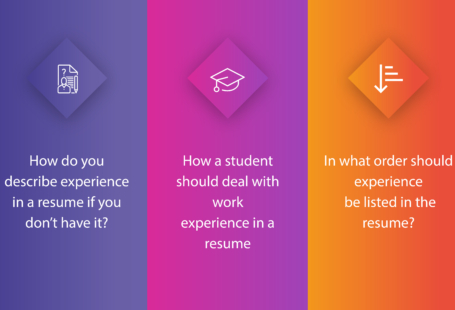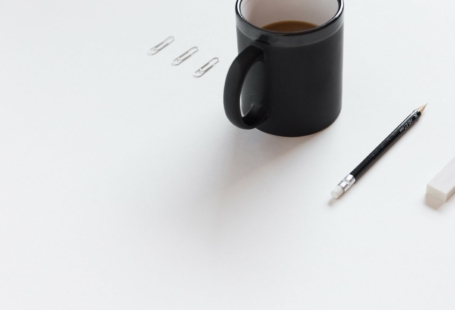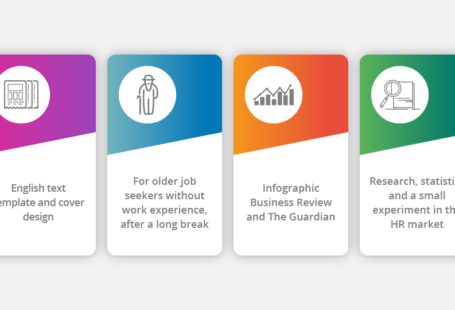This article shares valuable tips to face your next job interview. We all want to know how to be successful in an interview, and to do that, it’s important to watch out for the following common interview mistakes. This will give you more confidence in your chance of landing that dream role.
Best Practices: How to prepare for interview
Did you know that on average, only one in six interviews end up with a job offer?
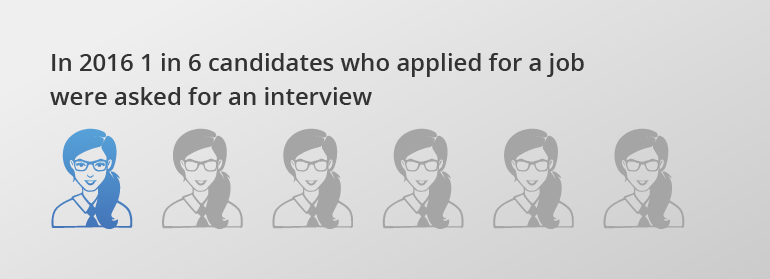
Here are some common interview mistakes that people can make when thinking about how to go in for an interview. Take note, because they may seem simple and like common sense, yet some people will surely be making these mistakes and damaging their chance of being that 1 in 6 successful person who gets the job.
What NOT to do?
Information about the company
We know that it’s important to go into the interview with some knowledge on the company you’ll be working for, but that does not mean focusing on details that actually have no relation to your role.
So if you find yourself on the company’s website, don’t focus on things like errors in their web design, or judgments about their writing copy or images. Sharing this with your interviewer won’t impress them at your level of error-spotting, it will make you come across as arrogant and really just missing the point, even if you have strong attention to detail and want to give your opinion – it’s not worth it.
Scheduling the interview
Successful job interviewing really does start the moment that the interview is being scheduled. You’re already making the first impression before they even see you, in how organized and professional you are when you are setting the interview.
Don’t reschedule your interview, unless something absolutely urgent comes up. Here’s what to know in how to schedule: Go with the time that the interviewer suggests and if it doesn’t work for you, provide many different options for times that work. This will ensure that you come across as accommodating and organized in your own professional schedule.
Tip 1: Hiring expert Rusty Rueff, when writing for Glassdoor, advises you to choose the time that primarily suits the interviewer himself, not you. If the recruiter provides choices that include early morning or late evening, try to avoid the start and end of the day and choose late morning or early afternoon instead. This will ensure that your interviewer doesn’t forget you by the end of the day, and also that they aren’t too tired right at the finish of their working day when they interview you.
Key points to prepare for interview meetings
Below are the key points to remember in your preparation for your interview.
- Learn as much as possible about the history of the company and its previous projects.
- Find out exactly what functions you’re expected to perform if you’re hired, and prepare to speak about the skills you have that are expected from this kind of role.
- Prepare answers in advance to questions that are likely to be asked, such as ‘what are your strengths and weaknesses’ and ‘why should we hire you?’
- Also, be prepared for uncomfortable questions. In this case, John Lees, author of “The Interview Expert: How to get the job you want”, advises you to be prepared for anything. A great example of this is explained by Lees: Suppose you were asked a question that you don’t yet know how to answer. Rather than be put on the spot and go silent trying to think of the answer, simply be prepared for this by creating more time to think about how to respond while you say ‘that’s an interesting question…’ or even summarising the question that they asked to create more time as you come to an answer.
- Dress professionally and appropriately for the role and company culture. It’s better to be overdressed than underdressed.
- Of course, always arrive 10-15 minutes before the appointed time. Arriving at the actual time is considered ‘late’ in the professional world.
Best practices: How to dress for an interview
The next step in how to prepare for interview meetings is to decide on the appropriate clothes to wear when you’re working out how to go for interview meetings.
What NOT to do?
Do not dress casually and show a lot of skin
Common interview mistakes also include how you dress for the interview. Also, if you have tattoos and piercings, cover them up. You may also have to let the interviewer know that you have them, but you don’t need to flaunt them in order for them to be aware. Cover them and tell them, and this will look far better for the interviewer to see that you’re willing to cover up if needed.
Consider makeup and hair
If you’re a woman, don’t go overboard in full-on makeup, as it may seem a little over-done for the role. Also, keep your hair tidy, thinking about the role that you’re going for and how you might be expected to do your hair (out and fashionably styled? Or clean and pulled back?)
Tip 2: According to a Career Builder study among HR managers, the colors of a candidate’s clothing will actually make a different impression in an interview. About 23% of interviewers recommend choosing blue shades, which can indicate that the candidate is a team player. Wear something black to show your leadership potential. Additionally, 25% of the interviewed HR-managers say that the worst shade of clothing for an interview – orange – is a sign of an unprofessional candidate.
The best way to dress for a successful interview
The following successful job interviewing tips on how to dress will make sure you’re making a professional and positive impact.
- Dress in business attire, but also keep in mind the role you are going for. If it is an office, corporate job, then dress more clean-cut and professional. If it is a more casual role like in retail or another industry, still dress professionally, but go for more of a business-casual style.
- Be restrained with accessories. Only wear jewelry that accentuates the professional look, otherwise, wear no accessories. As mentioned above, take out unprofessional-looking piercings (like eyebrow and nose rings).
- Think about the role you’re applying for and do a little research on google images, or by visiting stores or offices to check out what they’re wearing (if possible).
Best practices: When you arrive at the interview
What NOT to do?
Don’t show up late
Again, when thinking about how to be successful in an interview, know that it is not just the sitting down talking part that is important. If you only think about that part and disregard how you are showing up to the interview, this won’t look good.
With this in mind, don’t be late. If you know that you may be late due to something out of your control (like public transport breaking down or something else urgent) then call ahead. Also, if your interview is scheduled for 1:00 pm, do not arrive at 1:00 pm. As ‘on time’ is also considered late in this kind of scenario.
Tip 3: Mastering the art of casual conversation is going to be great for your interview. In a recent study conducted by the Georgia Institute of Technology and Texas Universities, candidates who were able to support small talk before the interview, received higher ratings than those who didn’t make any small stock. This indicates that small talk is a great first impression that you can make on the interviewer which could affect their subsequent decision of hiring you.
What you should do when you arrive at the interview?
The following tips are going to give the best impression to the interviewer in terms of how professional and interested in the role you are.
- Arrive 15 minutes before the interview time. As mentioned before, arriving ‘on time’ is actually considered late.
- If you’re running late (for a serious reason should you only be running late), then call ahead as soon as you can to let the interviewer know.
- If you feel like you are going to be more than 10 minutes late, when you call to let them know, also give the option to come another time as you express that you respect their time and schedule.
- When you arrive at the interview (in the case being in a waiting room or reception area) explain who you are, why you are there and politely sit and wait to be called for the interview.
Best practices: How to behave in an interview
Successful job interviewing requires the ability to balance speaking and listening, answering questions in a confident manner, and really just showing up as your best self.
What NOT to do?
Below are some of the common ‘types’ of interview behaviors that are definitely not going to help you land a job. Make sure you’re not playing one of these roles in your upcoming interview.
Mysterious Type
- Rarely speaking up and keeping your answers very short
- Thinking for a very long time before answering (awkward pauses)
- Not giving direct and specific answers, but being too passive and broad
- Not making eye contact.
Hysterical Type
- Speaking too loud and fast
- Making way too many hand gestures making you seem erratic in your energy
- Moving out of the chair and walking around as you speak
- Interrupting the interviewer.
Tip 4: Though it won’t be helpful to make too many hand gestures, don’t underestimate the power of gestures in also creating a positive impact. In an article for Business Insider, Shana Lebowitz explains that open palms indicate sincerity. Moreover, if the candidate holds his hands mainly with his palms down, this indicates his dominance, and if he taps his fingers, that expressed impatience. In general, know that excessive use of gestures can distract from the essence of what you say, and open body language can help to develop trust with the interviewer.
Hero Type
- Spending too much time talking about your past achievements
- Showing certificates, medals and other actual proof of those achievements (they really don’t care that you won your high school swimming race)
- Coming across as arrogant with speaking only about your successes in such a way that makes it seem like you’re compensating, or even downright lying.
Neurotic Type
- Being emotional past the point of passionate about the role, which comes across as desperation
- Touching your clothes and hair or things on the table out of nervousness
- Fidgeting and tapping hands to the table or shaking your leg as you sit
- Second-guessing what you say or even asking the interviewer ‘was that ok to say?’
Tip 5: The University of Guelph in Canada conducted a series of studies that sought to find out why neurotic and anxious candidates were not invited to roles that they applied for. According to the results, the main reason is the fact that overly excited and nervous-looking candidates do not give the impression of confidence and assertiveness.
Victim Type
- Expressing that this is your last chance or choice for a job
- Coming across as desperate in your language, being over-the-top grateful as if you are ‘pleading’ with the interviewer.
- Making promises that aren’t rational and cross the line of what the role is.
Revolutionary Type
- Adopting the air of ‘saving’ the company by being the only person who can do this, as if them hiring you is a big favor on your behalf
- Making strong statements and claims as if ‘you know best’
- Promising ridiculous results if you were to work there that clearly looks like you are just trying to say anything you can to get the role.
Tip 7: You can easily steer your revolutionary nature in the right direction and project it into energy and enthusiasm. As Jonathan Golding and Anne Lipert note in their study for Psychology Today, candidates with a high degree of energy and emotionality, which is expressed in a passionate (but not over-the-top) way, will more often get jobs than their calmer and more melancholy rivals.
Busy Type
- Letting the interviewer know how busy you are and that your time for the interview is ‘limited’
- Keeping your phone on and checking it or answering calls mid-interview
- Looking at your watch or the clock multiple times.
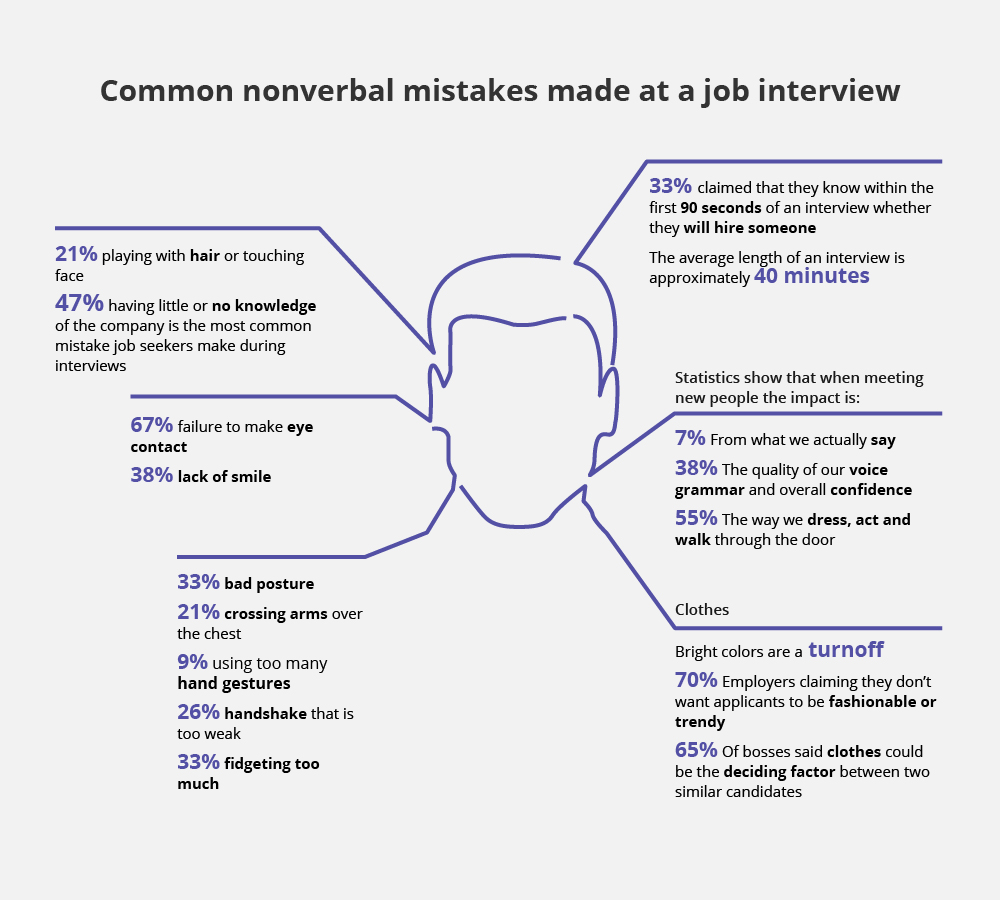
The best way to behave during the interview
It is important to remember that generally, there are three types of interviews:
- Screening interview
- Preliminaries interview
- The final interview
Depending on which interview you are taking, the way you interact will vary. The following tips, however, are still going to be valuable for how to be successful in an interview of any of the three types.
- Communicate with the interviewer in a positive and restrained manner (come across as professional and friendly)
- Listen carefully to the questions being asked and answer exactly what you’re asked, not what you think they are asking or what you may have ‘prepared’ before the interview
- Speak calmly, intelligibly and to the point. You don’t need to rush – speaking slower will make you seem calm and collected, and like you are sure of what you are saying.
- Own your accomplishments. Deborah M. Powell, a psychology researcher, shares that taking responsibility for a past project shows that you are confident and can be a leader.
- Smile… It can be worth a thousand words!
How to get a video call interview on Skype
For conducting remote interviews, Skype is often used (as a generally accepted tool), as well as video conferences from Google Hangouts or other messengers.
Here, the main stumbling block is usually a poor-quality connection. To ensure a good connection and an interview that won’t be disrupted, don’t skip a test call. Make sure the camera and microphone are set up properly and also have a neutral background and be in a space that doesn’t have loud or distracting sounds.
Tip 8: Check the speed of the Internet (for example, via https://www.speedtest.net/ or https://speedtest.net.ua/). For a comfortable video call, you need at least 8 Mb/s, and for audio – 3 Mb/s. It’s actually better to postpone the call than to conduct it with a poor connection, but try not to do this last minute, as that will seem like you were unprepared.
Remote interviews will also benefit from the same points as the normal interviews – smile, look neat, keep eye contact, speak slowly, and behave confidently. Keep a notebook and pen on hand to write down important notes, and let the interviewer know that you are doing this at the start of the interview. Also, in a notebook, you can write out a list of questions that you need to ask so you don’t forget anything. During a remote interview, you can peep at the “cheat sheet” as much as you like, which is a plus!
Best Practices: How to behave after the interview
counting”, the most important are the first ten minutes, after which there is often no reason to add Just because the interview is over does not mean the process of the interviewer considering you is over, so be mindful about how you are behaving after your interview, as that is something people can miss when thinking about how to go for interview meetings.
What NOT to do?
Even if you feel like you’ve had a successful first 25 minutes of the interview, it could all be ruined in the last 5 minutes if you’re not careful, or even after the interview is over in terms of how you act in the follow-up process.
Don’t call the employer immediately after the interview to ask for their answer. The same goes for a follow-up email. You can email to express your gratitude, but don’t ask about their decision the same day of the interview.
Tip 9: On average, an employer will make their decision anywhere from 24 hours after the end of the interview to up to two weeks. Want to know what the employer is really looking for? According to statistics provided by the Interview Success Formula, employers are looking for candidates with multitasking skills, creative thinking, and strong initiative.
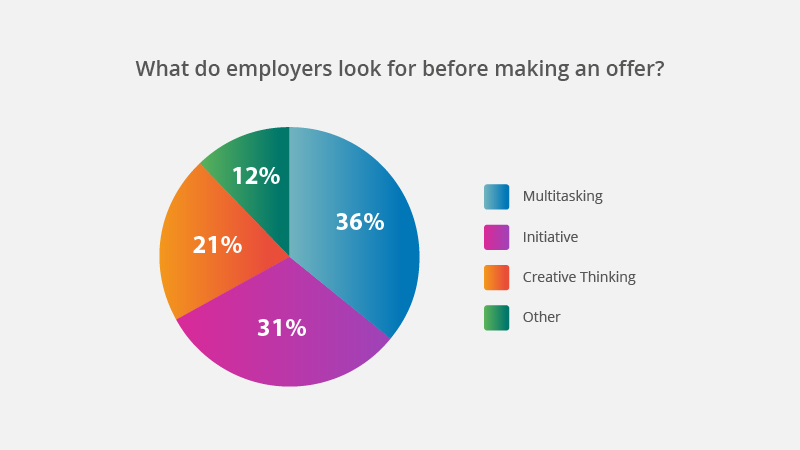
How to best behave after the interview
Take into account the following tips on how to best behave after the interview in order to raise your chance of success. It’s not just about how to go for interview meetings in the preparation and during the interview. These tips will be really helpful after the interview ends.
- Ask the interviewer in a polite way when you might expect the results of the interview
- Give them space for at least 24 hours before you write a follow-up email or call
- Regularly check your communication channels so that you don’t have their answer waiting without your response (check spam and junk folders in your email too)
- If it’s been a week without hearing back after the interview, call the company and politely ask if the employers made a decision
- When you write your first follow-up email (after waiting one day) express your gratitude at being considered, and keep it short and professional.
Tip 10: The results of a study published in SAGE Journals show that candidates often underestimate the power of follow up emails that express appreciation. They can go a long way, so don’t forget this simple, but important step.
How to be successful in an interview: In summary
Tip 11: An interview is not only an opportunity to prove oneself but also to learn more about the company that you’re looking to work for and what the role would be like if you were to get the job. 61% of employees surveyed say that the reality at a new place of work differs significantly from the expectations that arose during the interview. This means that the interview is a way for you to be able to walk out more clear about what to expect in this job, as you learn more than when you walked in.
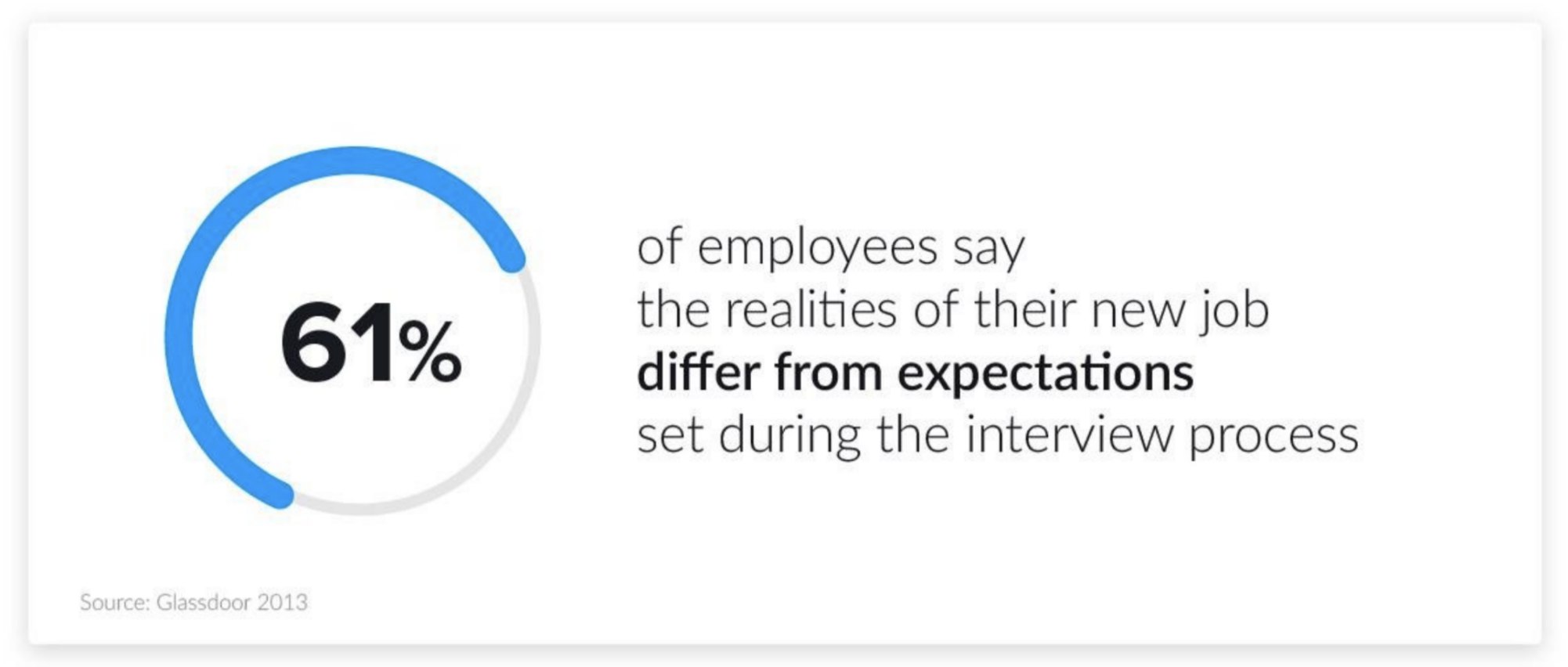
Remember that during the interview you are presenting yourself not only as a professional prospect but also as a person. Show your personality, be confident, speak with conviction, and remember the tips shared above, and you’ll be on your way to successful job interviewing, and maybe even your dream job.


